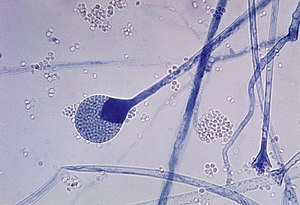Sporangium
an enclosure in which spores are formed
A sporangium (pl: sporangia) [1][2] is an enclosure in which spores are formed.[3] It can be a single cell or multicellular. All plants, fungi, and many other lineages form sporangia at some point in their life cycle. Sporangia can produce asexual spores by mitosis, but in nearly all land plants and many fungi, sporangia are the site of meiosis, and produce genetically unique haploid spores.




In flowering plants the sporangium tissue (except the epidermis) that produces the female spores is also called the nucellus.[4]
References
change- ↑ modern Latin, from Greek spora ‘spore’ + angeion ‘vessel'.
- ↑ also known as sporanges (sing., sporange) Oxford [1][permanent dead link]
- ↑ Rost, Barbour, Stocking, Murphy, 2006. Plant biology. 2nd ed, Thompson Brooks/Cole.
- ↑ Angiosperm Phylogeny Website, Glossary, retrieved 10 May 2015